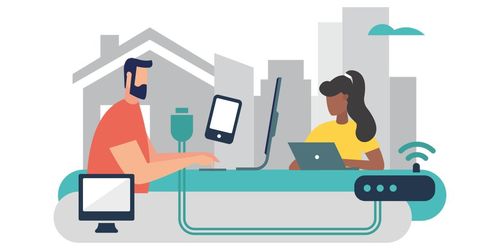E-working or remote working is a style of working that allows employees to work outside of a traditional office setting, usually at home, using computers. It is a type of employment that is on the rise globally. In a recent article, the Western Development Commission (WDC) discussed e-Working and pilot data from the Central Statistics Office on the topic of e-working/remote work: “The CSO invited submissions to the consultation on questions for inclusion in Census 2021. In its submission, the WDC advocated for the inclusion of a question to more effectively capture the extent of Working from home/e-working. Following the consultation exercise and a pilot exercise the CSO have now agreed to include a question measuring the number of days people work from home on a weekly basis in Census 2021. The results of the pilot survey were released earlier this year and they provide an insight into e-working.”
On page 24 of the CSO pilot data report, Q32 on the topic ‘Work from Home’ indicates that 18% of respondents declared that they work from home. Of this number, 35% stated that they work from home 1 day a week, 13% work 2 days a week, and 11% work 5 days a week from home. While this pilot data gives us a little bit of insight into how many people regularly work remotely as part of their normal working lives, the inclusion of the question on the 2021 Census will give a much clearer image of the number of people engaged in e-working in Ireland.
In the same article, the WDC also cite the CSO data pertaining to the broadband usage of those who stated they worked from home. 79% had fixed broadband internet, 18% had mobile broadband internet, and 3% indicated that they had no internet connection. The WDC speculates that “it is possible that much of this 3% do not depend on internet access to conduct their work, for example those engaged in agriculture.” E-working depends on decent internet connection speeds, and with the rollout of the National Broadband Plan aimed at increasing the availability of high-speed internet nationally, working from home using computers could become a more viable option. In particular for people who face barriers in accessing or getting to work because of inadequate public transportation, a lack of decent work opportunities, and / or are living with a disability.
In terms of policy development on a governmental level, one of the goals of the Future Jobs Ireland 2019 framework is to promote more flexible working options for employees, including remote working. Under ‘Pillar 4. Increasing Participation in the Labour Force’ of the Future Jobs Ireland 2019 report, the section ‘Ambition 4.2: Foster participation in the labour force through flexible working solutions’ encourages remote working as a viable solution for increasing participation in the labour force: “Flexible working encompasses a wide range of practices including part-time, remote working, compressed hours, home-working and job sharing.”
A report has been released by the Department of Business, Enterprise and Innovation on the subject of Remote Working and can be found here, which states: “Flexible working solutions, such as remote work, are becoming a priority from a range of perspectives, from sustainability and positive environmental impacts, to increasing participation amongst women, older people and people with disabilities.”
With the application of policies to increase internet availability and to promote flexible working options as a norm across different sectors of Irish businesses, remote working could be a practical, realistic option for people who are unemployed and facing physical challenges in accessing decent employment.
